牛津译林版(2019)必修 第二册Unit 4 Exploring literature Welcome to the unit & Reading课件(共45张PPT)
文档属性
| 名称 | 牛津译林版(2019)必修 第二册Unit 4 Exploring literature Welcome to the unit & Reading课件(共45张PPT) | 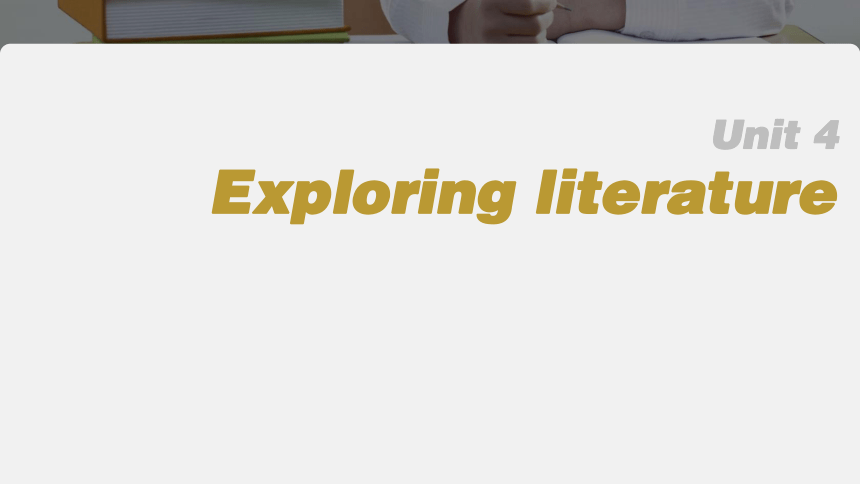 | |
| 格式 | pptx | ||
| 文件大小 | 24.4MB | ||
| 资源类型 | 教案 | ||
| 版本资源 | 牛津译林版(2019) | ||
| 科目 | 英语 | ||
| 更新时间 | 2023-05-25 12:02:36 | ||
图片预览

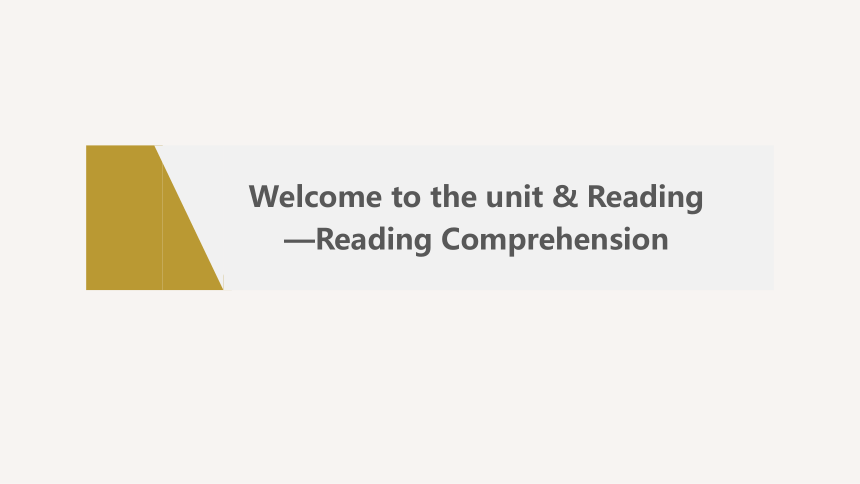
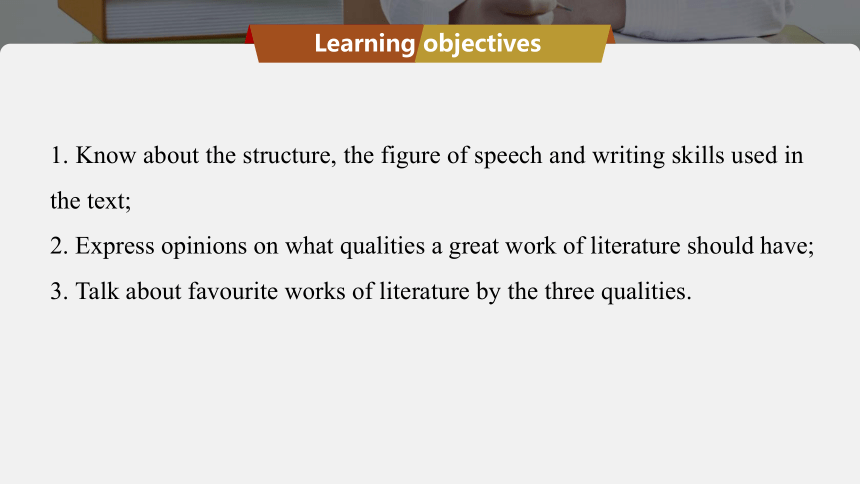
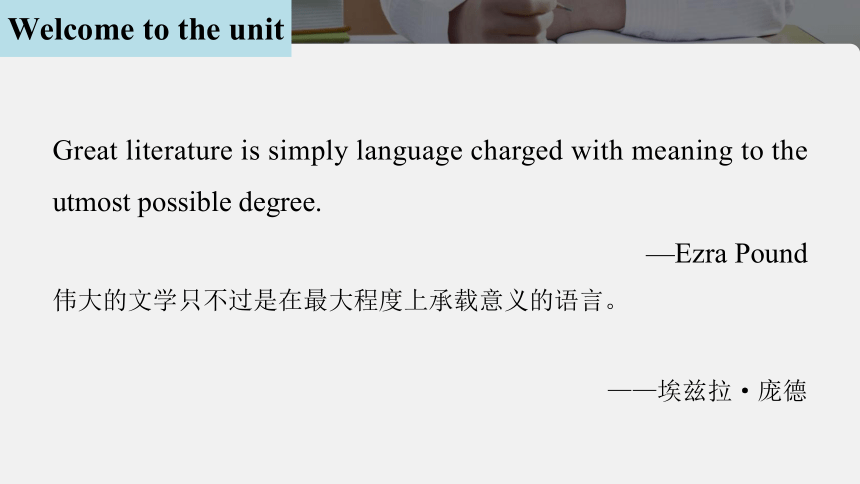
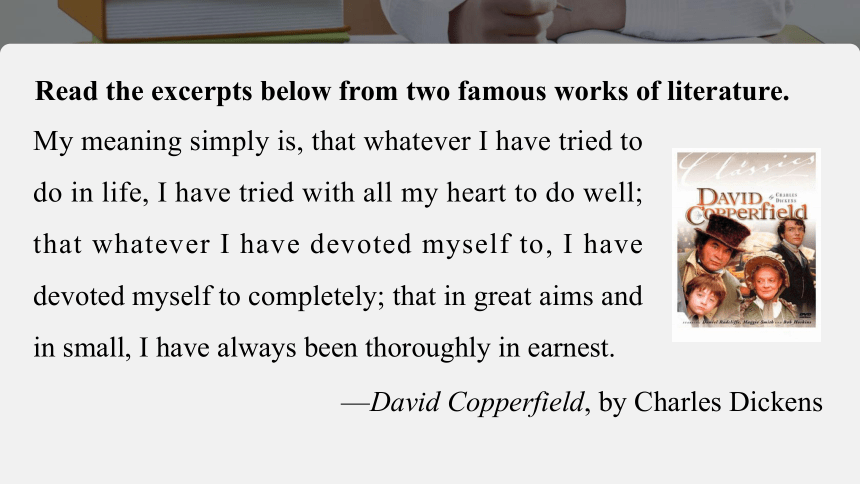
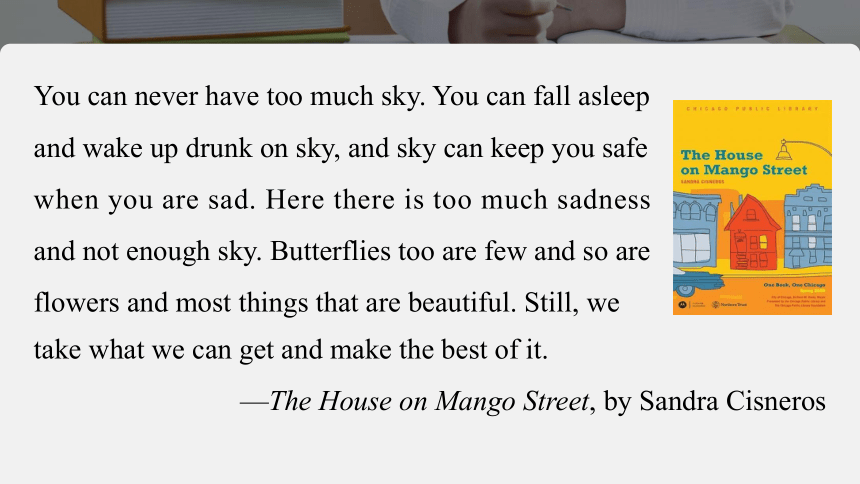
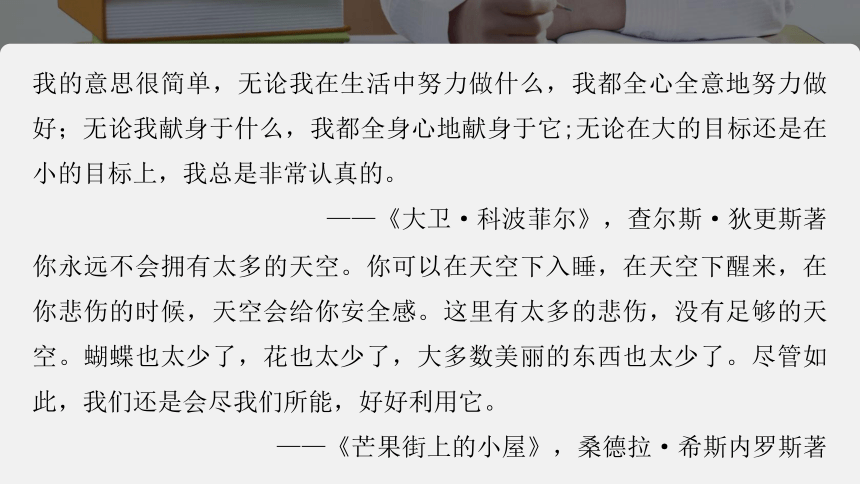
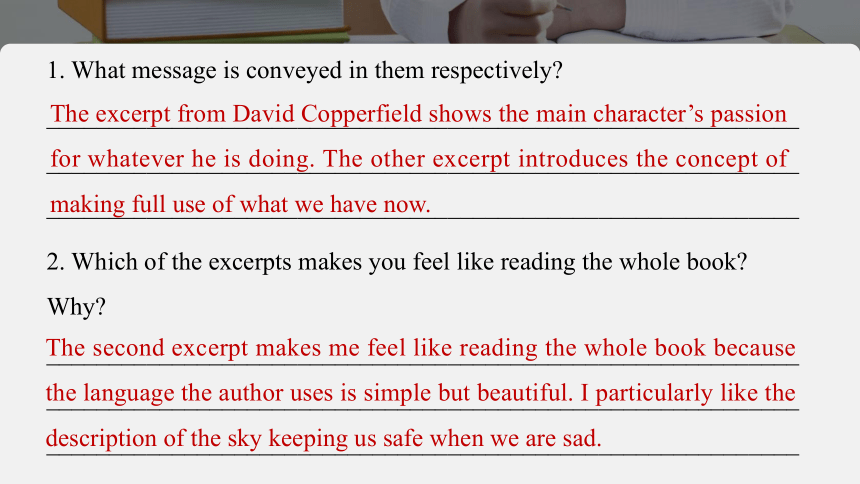
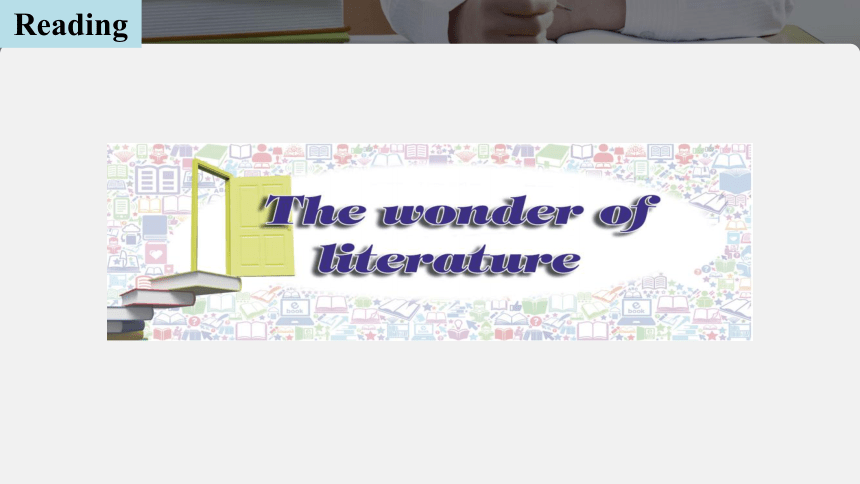
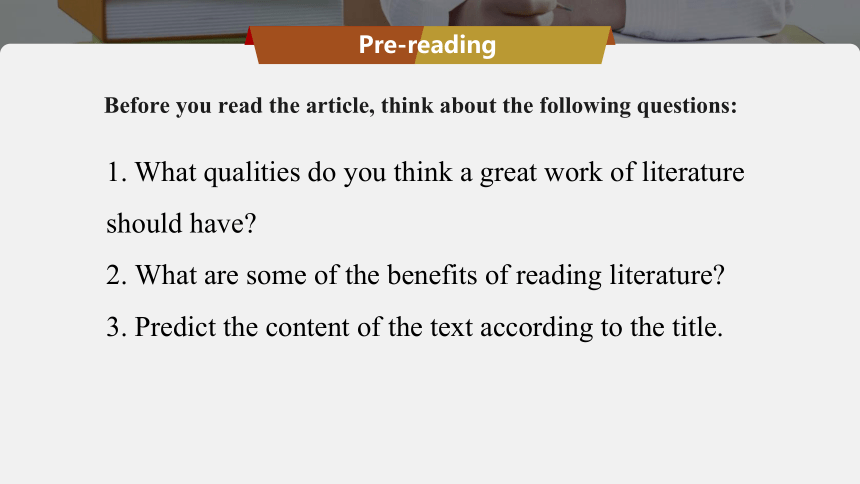
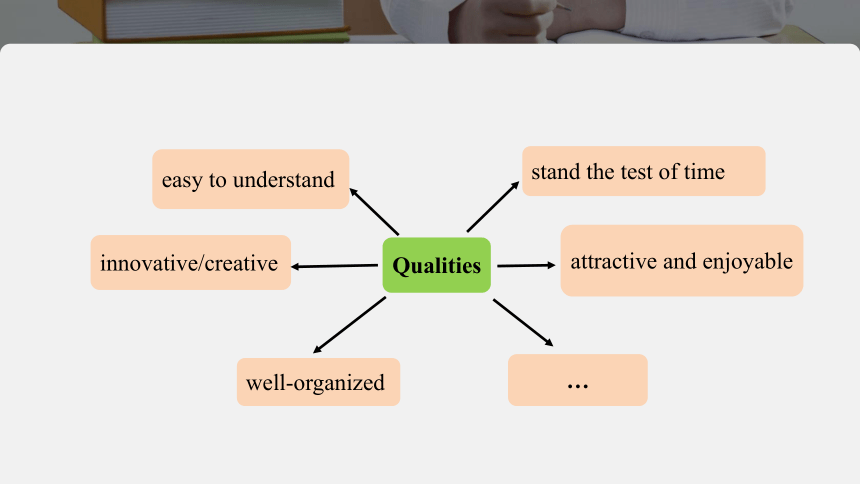
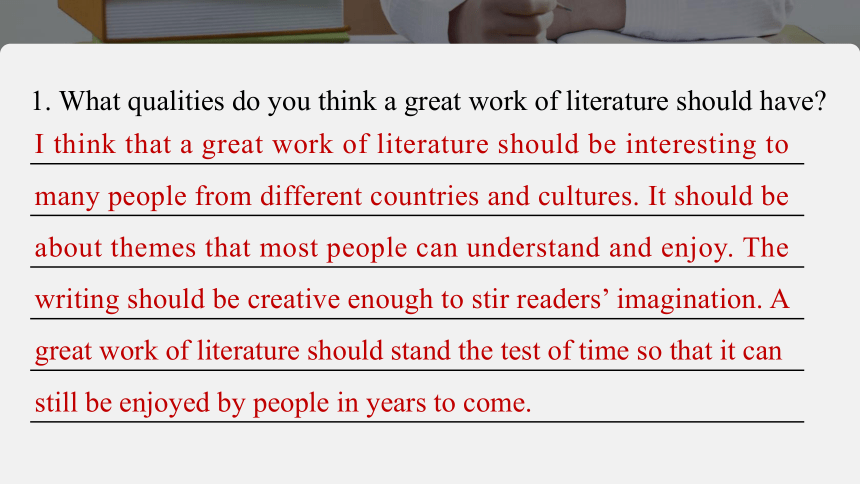
文档简介
(共45张PPT)
Unit 4
Exploring literature
Welcome to the unit & Reading
—Reading Comprehension
1. Know about the structure, the figure of speech and writing skills used in the text;
2. Express opinions on what qualities a great work of literature should have;
3. Talk about favourite works of literature by the three qualities.
Learning objectives
Great literature is simply language charged with meaning to the utmost possible degree.
—Ezra Pound
伟大的文学只不过是在最大程度上承载意义的语言。
——埃兹拉·庞德
Welcome to the unit
My meaning simply is, that whatever I have tried to do in life, I have tried with all my heart to do well; that whatever I have devoted myself to, I have devoted myself to completely; that in great aims and in small, I have always been thoroughly in earnest.
—David Copperfield, by Charles Dickens
Read the excerpts below from two famous works of literature.
You can never have too much sky. You can fall asleep and wake up drunk on sky, and sky can keep you safe when you are sad. Here there is too much sadness and not enough sky. Butterflies too are few and so are flowers and most things that are beautiful. Still, we
take what we can get and make the best of it.
—The House on Mango Street, by Sandra Cisneros
我的意思很简单,无论我在生活中努力做什么,我都全心全意地努力做好;无论我献身于什么,我都全身心地献身于它;无论在大的目标还是在小的目标上,我总是非常认真的。
——《大卫·科波菲尔》,查尔斯·狄更斯著
你永远不会拥有太多的天空。你可以在天空下入睡,在天空下醒来,在你悲伤的时候,天空会给你安全感。这里有太多的悲伤,没有足够的天空。蝴蝶也太少了,花也太少了,大多数美丽的东西也太少了。尽管如此,我们还是会尽我们所能,好好利用它。
——《芒果街上的小屋》,桑德拉·希斯内罗斯著
1. What message is conveyed in them respectively
____________________________________________________________
____________________________________________________________
____________________________________________________________
The excerpt from David Copperfield shows the main character’s passion for whatever he is doing. The other excerpt introduces the concept of making full use of what we have now.
2. Which of the excerpts makes you feel like reading the whole book
Why
____________________________________________________________
____________________________________________________________
____________________________________________________________
The second excerpt makes me feel like reading the whole book because the language the author uses is simple but beautiful. I particularly like the description of the sky keeping us safe when we are sad.
Reading
Before you read the article, think about the following questions:
Pre-reading
1. What qualities do you think a great work of literature
should have
2. What are some of the benefits of reading literature
3. Predict the content of the text according to the title.
easy to understand
…
attractive and enjoyable
innovative/creative
well-organized
stand the test of time
Qualities
1. What qualities do you think a great work of literature should have
I think that a great work of literature should be interesting to many people from different countries and cultures. It should be about themes that most people can understand and enjoy. The writing should be creative enough to stir readers’ imagination. A great work of literature should stand the test of time so that it can still be enjoyed by people in years to come.
2. What are some of the benefits of reading literature
Reading literature helps us learn more about our own and other cultures. The power of the words used in literature allows us to experience imaginary situations. Another benefit is that by reading between the lines every reader interprets a piece of literature differently, making it a good topic for discussion.
3. Predict the content of the text according to the title.
Some significant qualities of literature.
Introduction
Conclusion
Its description of truth and beauty
Its appeal to our feelings and imagination
Permanence
introduce the topic
three qualities
the significance
argumentation
While-reading
Activity 1 Fast-reading for main ideas
Paras. 1-2
1. How does the writer introduce the topic of the text
A. By giving a definition.
B. By giving an example.
C. By listing numbers.
The sounds are too faint for human ears.
√
Activity 2 Careful-reading for details
2. What does “them” in Line 3 refer to
“Them” in Line 3 refers to strange, low, musical sounds.
3. What do we need to do in order to enter and enjoy the new world mentioned in the second paragraph
4. What does the child stand for What does the man stand for
We need to love literature, and make an effort to explain it.
people who love and enjoy literature
people who make an effort to explain and understand literature
5. “Behind every book is a man, behind the man is the race, and behind the race are the natural and social environments.” To what degree do you agree with the author Give your reasons.
Absolutely. We are all influenced by the world around us, regardless of how unique our experiences are. Similarly, a writer is influenced by his or her background—gender, race, natural and social environment will have a huge impact on and be reflected in his or her works. Therefore, the more you know about the writer, the better you can understand the message he or she wants to convey.
6. Paraphrase: Some such experience as this lies in store for us when we begin the study of literature.
_________________________________________________________________________
Some such experience as this may happen to us when we begin the study of literature.
Its description of
truth and beauty
Its appeal to our
feelings and imagination
Universal interest
Personal style
Paras. 3-5
1. Complete the chart about the three qualities of literature.
2. Why does the author give the example of a poet
A. To ask us to care the truth and beauty of literature.
B. To ask us to read more poems written by the poet.
C. To stop to look at the dead grass and write poems.
D. To stop to talk with a sensitive human soul.
√
3. How do you understand the line of the poet “Yesterday’s flowers am I.” in Paragraph 3
The literal meaning of this line is that the dead grass may once have been blooming flowers. The poet wants to remind readers of the former glory of a thing, although it is going through a process of decline. A good poet often notices something unnoticed by others and can present it to readers with vivid language.
4. What does “what it awakens in us” refer to in Paragraph 4
It refers to the feelings and imagination that can be stirred by literature in our mind.
5. Why does the author give the example of Faustus in Para. 4
A. To appeal to us to read the stories about him.
B. To seek the answer to his question.
C. To prove that Helen is a beauty and heroine.
D. To tell that literature can bring readers’ imagination.
√
“Was this the face that launched a thousand ships ” he opens a door through which our imagination enters a new world, a world of love, beauty and heroism.
Helen: Helen of Troy, 特洛伊的海伦是希腊神话中的绝世美女,原是希腊南部斯巴达国国王 Menelaus的妻子,特洛伊的王子Paris贪恋她的美貌,在爱与美之神Aphrodite的帮助下,把Helen诱拐了。国王当时出远门了,回来得知后大怒,发誓要血洗特洛伊。就这样两国展开了十年之久的战争,双方死伤无数,最后希腊采用了“木马计”—the Trojan Horse ,战胜了Troy,杀死了Paris,抢回了Helen。
6. What writing techniques does the author not use in Paras. 3-4
A.Comparison(作比较).
B.Quotation(引用).
C.Giving examples.
D.Listing numbers.
√
7. What does “permanence” refer to in Para. 5
Permanence contains two elements:universal interest and personal style. Universal interest refers to the most basic of human nature— ______________________________________. Personal style refers to the writer’s ______________________
________________________.
love and hate, joy and sadness, fear and hope
own life and experiences
reflected in his or her works
In summary, literature is the expression of life in forms of truth and beauty, the written record of man’s thoughts and feelings, and the history of the human soul.
总之,文学是以真和美的形式对生命的表达,是人类思想和感情的写照,是人类灵魂的历史。
Translate the last paragraph into Chinese.
Para. 6
Let a little song appeal to the ear, or a great book to the heart, and we discover a new world, a world of dreams and magic. (Para. 2, lines 8–9)
Parallelism, also called parallel structure, is the similarity of structure in a pair or series of related words, phrases, or clauses.
Parallelism has the potential to create rhythm, emphasis, and drama as it clearly presents ideas or action.
Rhetorical Device (修辞手法)
Parallelism(排比)
Anadiplosis(顶真)
Anadiplosis is commonly used for emphasis through the repetition of a key word or phrase, or to link a common theme through several separate clauses—often more than two. It’s also useful as a rhythmic device, breaking up what would otherwise be straightforward clauses and giving them an extra pause. This often results in a sentence that is more interesting to read or hear.
Behind every book is a man, behind the man is the race, and behind the race are the natural and social environments. (Para. 2, lines 10–12)
Analogy(类比)
Some truth and beauty remain unnoticed until a sensitive human soul brings them to our attention, just as the shell reflects the unnoticed sounds. (Para. 3, lines 15–17)
Analogy is a figure of speech in which two fundamentally unlike things are explicitly compared, usually in a phrase introduced by like or as.
In everyday conversations as well as in writing and formal speeches, we use analogies to clarify ideas, create memorable images, and emphasize key points.
1. How is the story of the child and the man related to the topic of literature?(Critical Thinking 批判性思维)
The story of the man and the child is similar to the study of literature. The child stands for people who love and enjoy literature, while the man stands for people who make an effort to explain and understand literature. The child is amazed at the sounds he hears through a shell, just as a literature-lover discovers a new world through the study of literature. The shell catches a range of sounds that human ears would have missed, just as great writers bring unnoticed truth and beauty in the world to the reader’s attention.
Post-reading
Activity 1 Discussion
2. Judge your favourite Chinese work of literature by the three qualities in the article. How does it measure up?(Creative Thinking创造性思维)
__________________________________________________________
Answers may vary.
We can get a lot of benefits 1.______ reading literature,as reading literature 2._______(create) a world of dreams and magic for us. 3.________(enjoy) and understand literature, we should know some of its 4.__________(significance) qualities. The first quality is its description of truth and beauty 5._________ will remain unnoticed 6._____ some sensitive human souls bring them to our attention. The second quality is 7.____(it) appeal to our feelings and imagination. The third quality is its permanence, which contains two
from
creates
To enjoy
significant
which/that
unless
its
Activity 2 Summary
elements: universal interest and 8.________(person) style. In summary,literature is the 9.___________(express) of life in forms of truth and beauty, the 10._______(write) record of man’s thoughts and feelings, and the history of the human soul.
personal
expression
written
A child and a man were walking on the beach when the child found a shell and held it to his ear. Suddenly he heard strange, low, musical sounds. These sounds seemed to be from another world and the child listened to them with wonder. Then the man explained that the child heard nothing strange,and that the shell caught a range of sounds too faint for human ears.What amazed the child was not a new world, but the unnoticed music of the old.
be doing... when... 正在做……这时……
that引导并列宾语从句
what引导主语从句
系列,各种
Activity 3 Analyze the key points of the text
Para. 1
Some such experience as this lies in store for us when we begin the study of literature. Let a little song appeal to the ear, or a great book to the heart, and we discover a new world, a world of dreams and magic. To enter and enjoy this new world, we need to love literature, and make an effort to explain it. Behind every book is a man, behind the man is the race, and behind the race are the natural and social environments. We must know all these, if the book is to speak its whole message. In a word, we have now reached a point where we wish to enjoy and understand literature. The first step is to determine some of its significant qualities.
即将发生(在某人身上),等待着 (某人)
努力做……
同位语
定语从句
Para. 2
The first quality of literature is its description of truth and beauty. Some truth and beauty remain unnoticed until a sensitive human soul brings them to our attention, just as the shell reflects the unnoticed sounds. A hundred men may pass a field and see only dead grass; but a poet stops, looks deeper, sees truth and beauty, and writes, “Yesterday’s flowers am I.”One who reads it is capable of seeing the beauty that was hidden from his eyes before.
until引导时间状语从句
are ignored被忽视
as引导方式状语从句
定语从句
定语从句
Para. 3
The second quality of literature is its appeal to our feelings and imagination. Its attraction lies more in what it awakens in us than what it says.When Christopher Marlowe’s Doctor Faustus asks in the presence of Helen, “Was this the face that launched a thousand ships?” he opens a door through which our imagination enters a new world,
a world of love, beauty and heroism.
what引导宾语从句
lie in在于
when引导时间状语从句
that引导定语从句
“介词+关系代词”引导的定语从句
同位语
Para. 4
The third quality of literature, coming out of the other two, is its permanence. To achieve this, it should contain two elements: universal interest and personal style. Good literature reflects the most basic of human nature—love and hate, joy and sadness, fear and hope. It also takes on a personal style—no writer can describe human life without reflecting his own life and experiences.
All writers reflect their own life and experiences when describing human life.
现在分词短语作定语
呈现
双重否定等于肯定
Para. 5
Preview language points and recite
the key points of the text.
Homework
Unit 4
Exploring literature
Welcome to the unit & Reading
—Reading Comprehension
1. Know about the structure, the figure of speech and writing skills used in the text;
2. Express opinions on what qualities a great work of literature should have;
3. Talk about favourite works of literature by the three qualities.
Learning objectives
Great literature is simply language charged with meaning to the utmost possible degree.
—Ezra Pound
伟大的文学只不过是在最大程度上承载意义的语言。
——埃兹拉·庞德
Welcome to the unit
My meaning simply is, that whatever I have tried to do in life, I have tried with all my heart to do well; that whatever I have devoted myself to, I have devoted myself to completely; that in great aims and in small, I have always been thoroughly in earnest.
—David Copperfield, by Charles Dickens
Read the excerpts below from two famous works of literature.
You can never have too much sky. You can fall asleep and wake up drunk on sky, and sky can keep you safe when you are sad. Here there is too much sadness and not enough sky. Butterflies too are few and so are flowers and most things that are beautiful. Still, we
take what we can get and make the best of it.
—The House on Mango Street, by Sandra Cisneros
我的意思很简单,无论我在生活中努力做什么,我都全心全意地努力做好;无论我献身于什么,我都全身心地献身于它;无论在大的目标还是在小的目标上,我总是非常认真的。
——《大卫·科波菲尔》,查尔斯·狄更斯著
你永远不会拥有太多的天空。你可以在天空下入睡,在天空下醒来,在你悲伤的时候,天空会给你安全感。这里有太多的悲伤,没有足够的天空。蝴蝶也太少了,花也太少了,大多数美丽的东西也太少了。尽管如此,我们还是会尽我们所能,好好利用它。
——《芒果街上的小屋》,桑德拉·希斯内罗斯著
1. What message is conveyed in them respectively
____________________________________________________________
____________________________________________________________
____________________________________________________________
The excerpt from David Copperfield shows the main character’s passion for whatever he is doing. The other excerpt introduces the concept of making full use of what we have now.
2. Which of the excerpts makes you feel like reading the whole book
Why
____________________________________________________________
____________________________________________________________
____________________________________________________________
The second excerpt makes me feel like reading the whole book because the language the author uses is simple but beautiful. I particularly like the description of the sky keeping us safe when we are sad.
Reading
Before you read the article, think about the following questions:
Pre-reading
1. What qualities do you think a great work of literature
should have
2. What are some of the benefits of reading literature
3. Predict the content of the text according to the title.
easy to understand
…
attractive and enjoyable
innovative/creative
well-organized
stand the test of time
Qualities
1. What qualities do you think a great work of literature should have
I think that a great work of literature should be interesting to many people from different countries and cultures. It should be about themes that most people can understand and enjoy. The writing should be creative enough to stir readers’ imagination. A great work of literature should stand the test of time so that it can still be enjoyed by people in years to come.
2. What are some of the benefits of reading literature
Reading literature helps us learn more about our own and other cultures. The power of the words used in literature allows us to experience imaginary situations. Another benefit is that by reading between the lines every reader interprets a piece of literature differently, making it a good topic for discussion.
3. Predict the content of the text according to the title.
Some significant qualities of literature.
Introduction
Conclusion
Its description of truth and beauty
Its appeal to our feelings and imagination
Permanence
introduce the topic
three qualities
the significance
argumentation
While-reading
Activity 1 Fast-reading for main ideas
Paras. 1-2
1. How does the writer introduce the topic of the text
A. By giving a definition.
B. By giving an example.
C. By listing numbers.
The sounds are too faint for human ears.
√
Activity 2 Careful-reading for details
2. What does “them” in Line 3 refer to
“Them” in Line 3 refers to strange, low, musical sounds.
3. What do we need to do in order to enter and enjoy the new world mentioned in the second paragraph
4. What does the child stand for What does the man stand for
We need to love literature, and make an effort to explain it.
people who love and enjoy literature
people who make an effort to explain and understand literature
5. “Behind every book is a man, behind the man is the race, and behind the race are the natural and social environments.” To what degree do you agree with the author Give your reasons.
Absolutely. We are all influenced by the world around us, regardless of how unique our experiences are. Similarly, a writer is influenced by his or her background—gender, race, natural and social environment will have a huge impact on and be reflected in his or her works. Therefore, the more you know about the writer, the better you can understand the message he or she wants to convey.
6. Paraphrase: Some such experience as this lies in store for us when we begin the study of literature.
_________________________________________________________________________
Some such experience as this may happen to us when we begin the study of literature.
Its description of
truth and beauty
Its appeal to our
feelings and imagination
Universal interest
Personal style
Paras. 3-5
1. Complete the chart about the three qualities of literature.
2. Why does the author give the example of a poet
A. To ask us to care the truth and beauty of literature.
B. To ask us to read more poems written by the poet.
C. To stop to look at the dead grass and write poems.
D. To stop to talk with a sensitive human soul.
√
3. How do you understand the line of the poet “Yesterday’s flowers am I.” in Paragraph 3
The literal meaning of this line is that the dead grass may once have been blooming flowers. The poet wants to remind readers of the former glory of a thing, although it is going through a process of decline. A good poet often notices something unnoticed by others and can present it to readers with vivid language.
4. What does “what it awakens in us” refer to in Paragraph 4
It refers to the feelings and imagination that can be stirred by literature in our mind.
5. Why does the author give the example of Faustus in Para. 4
A. To appeal to us to read the stories about him.
B. To seek the answer to his question.
C. To prove that Helen is a beauty and heroine.
D. To tell that literature can bring readers’ imagination.
√
“Was this the face that launched a thousand ships ” he opens a door through which our imagination enters a new world, a world of love, beauty and heroism.
Helen: Helen of Troy, 特洛伊的海伦是希腊神话中的绝世美女,原是希腊南部斯巴达国国王 Menelaus的妻子,特洛伊的王子Paris贪恋她的美貌,在爱与美之神Aphrodite的帮助下,把Helen诱拐了。国王当时出远门了,回来得知后大怒,发誓要血洗特洛伊。就这样两国展开了十年之久的战争,双方死伤无数,最后希腊采用了“木马计”—the Trojan Horse ,战胜了Troy,杀死了Paris,抢回了Helen。
6. What writing techniques does the author not use in Paras. 3-4
A.Comparison(作比较).
B.Quotation(引用).
C.Giving examples.
D.Listing numbers.
√
7. What does “permanence” refer to in Para. 5
Permanence contains two elements:universal interest and personal style. Universal interest refers to the most basic of human nature— ______________________________________. Personal style refers to the writer’s ______________________
________________________.
love and hate, joy and sadness, fear and hope
own life and experiences
reflected in his or her works
In summary, literature is the expression of life in forms of truth and beauty, the written record of man’s thoughts and feelings, and the history of the human soul.
总之,文学是以真和美的形式对生命的表达,是人类思想和感情的写照,是人类灵魂的历史。
Translate the last paragraph into Chinese.
Para. 6
Let a little song appeal to the ear, or a great book to the heart, and we discover a new world, a world of dreams and magic. (Para. 2, lines 8–9)
Parallelism, also called parallel structure, is the similarity of structure in a pair or series of related words, phrases, or clauses.
Parallelism has the potential to create rhythm, emphasis, and drama as it clearly presents ideas or action.
Rhetorical Device (修辞手法)
Parallelism(排比)
Anadiplosis(顶真)
Anadiplosis is commonly used for emphasis through the repetition of a key word or phrase, or to link a common theme through several separate clauses—often more than two. It’s also useful as a rhythmic device, breaking up what would otherwise be straightforward clauses and giving them an extra pause. This often results in a sentence that is more interesting to read or hear.
Behind every book is a man, behind the man is the race, and behind the race are the natural and social environments. (Para. 2, lines 10–12)
Analogy(类比)
Some truth and beauty remain unnoticed until a sensitive human soul brings them to our attention, just as the shell reflects the unnoticed sounds. (Para. 3, lines 15–17)
Analogy is a figure of speech in which two fundamentally unlike things are explicitly compared, usually in a phrase introduced by like or as.
In everyday conversations as well as in writing and formal speeches, we use analogies to clarify ideas, create memorable images, and emphasize key points.
1. How is the story of the child and the man related to the topic of literature?(Critical Thinking 批判性思维)
The story of the man and the child is similar to the study of literature. The child stands for people who love and enjoy literature, while the man stands for people who make an effort to explain and understand literature. The child is amazed at the sounds he hears through a shell, just as a literature-lover discovers a new world through the study of literature. The shell catches a range of sounds that human ears would have missed, just as great writers bring unnoticed truth and beauty in the world to the reader’s attention.
Post-reading
Activity 1 Discussion
2. Judge your favourite Chinese work of literature by the three qualities in the article. How does it measure up?(Creative Thinking创造性思维)
__________________________________________________________
Answers may vary.
We can get a lot of benefits 1.______ reading literature,as reading literature 2._______(create) a world of dreams and magic for us. 3.________(enjoy) and understand literature, we should know some of its 4.__________(significance) qualities. The first quality is its description of truth and beauty 5._________ will remain unnoticed 6._____ some sensitive human souls bring them to our attention. The second quality is 7.____(it) appeal to our feelings and imagination. The third quality is its permanence, which contains two
from
creates
To enjoy
significant
which/that
unless
its
Activity 2 Summary
elements: universal interest and 8.________(person) style. In summary,literature is the 9.___________(express) of life in forms of truth and beauty, the 10._______(write) record of man’s thoughts and feelings, and the history of the human soul.
personal
expression
written
A child and a man were walking on the beach when the child found a shell and held it to his ear. Suddenly he heard strange, low, musical sounds. These sounds seemed to be from another world and the child listened to them with wonder. Then the man explained that the child heard nothing strange,and that the shell caught a range of sounds too faint for human ears.What amazed the child was not a new world, but the unnoticed music of the old.
be doing... when... 正在做……这时……
that引导并列宾语从句
what引导主语从句
系列,各种
Activity 3 Analyze the key points of the text
Para. 1
Some such experience as this lies in store for us when we begin the study of literature. Let a little song appeal to the ear, or a great book to the heart, and we discover a new world, a world of dreams and magic. To enter and enjoy this new world, we need to love literature, and make an effort to explain it. Behind every book is a man, behind the man is the race, and behind the race are the natural and social environments. We must know all these, if the book is to speak its whole message. In a word, we have now reached a point where we wish to enjoy and understand literature. The first step is to determine some of its significant qualities.
即将发生(在某人身上),等待着 (某人)
努力做……
同位语
定语从句
Para. 2
The first quality of literature is its description of truth and beauty. Some truth and beauty remain unnoticed until a sensitive human soul brings them to our attention, just as the shell reflects the unnoticed sounds. A hundred men may pass a field and see only dead grass; but a poet stops, looks deeper, sees truth and beauty, and writes, “Yesterday’s flowers am I.”One who reads it is capable of seeing the beauty that was hidden from his eyes before.
until引导时间状语从句
are ignored被忽视
as引导方式状语从句
定语从句
定语从句
Para. 3
The second quality of literature is its appeal to our feelings and imagination. Its attraction lies more in what it awakens in us than what it says.When Christopher Marlowe’s Doctor Faustus asks in the presence of Helen, “Was this the face that launched a thousand ships?” he opens a door through which our imagination enters a new world,
a world of love, beauty and heroism.
what引导宾语从句
lie in在于
when引导时间状语从句
that引导定语从句
“介词+关系代词”引导的定语从句
同位语
Para. 4
The third quality of literature, coming out of the other two, is its permanence. To achieve this, it should contain two elements: universal interest and personal style. Good literature reflects the most basic of human nature—love and hate, joy and sadness, fear and hope. It also takes on a personal style—no writer can describe human life without reflecting his own life and experiences.
All writers reflect their own life and experiences when describing human life.
现在分词短语作定语
呈现
双重否定等于肯定
Para. 5
Preview language points and recite
the key points of the text.
Homework
